How many among the factors given below result in pilling up of organic matter ?
Warm environment , Anaerobic condition, Low moisture <10∘C temperature.
Three.
Topper's Solved these Questions
- ECOSYSTEMBOOK - AAKASH INSTITUTECHAPTER - ECOSYSTEMEXERCISE - Exercise
20 Videos
- ECOSYSTEMBOOK - AAKASH INSTITUTECHAPTER - ECOSYSTEMEXERCISE - Assignment (Section A)
35 Videos
- ECOSYSTEMBOOK - AAKASH INSTITUTECHAPTER - ECOSYSTEMEXERCISE - Section - D (Assertion - Reasion Type questions)
15 Videos
- DIGESTION AND ABSORPTION BOOK - AAKASH INSTITUTECHAPTER - DIGESTION AND ABSORPTION EXERCISE - Assignment (SECTION-D Assertion - Reason Type Questions )
10 Videos
- ENVIRONMENTAL ISSUESBOOK - AAKASH INSTITUTECHAPTER - ENVIRONMENTAL ISSUESEXERCISE - ASSIGNMENT SECTION D
15 Videos
Similar Questions
How many compounds are organic compounds among the compounds given below ?

View SolutionThe following line graph shows the change in temperature of a block of ice when heated.

Study the above graph carefully and answer the questions given below :
(i) For how many seconds did the ice block have no change in temperature?
(ii) For how long was there a change in temperature?
(iii) After how many seconds of heating did the temperature become constant at 100∘C ?
(iv) What was the temperature after 25 seconds?
(v) What will be the temperature after 1.5 minutes ? Justify your answer.
View Solution
Knowledge Check
A(s)⇔B(s)+C(g)−Heat
Arrange the conditions which are given below and applied on the above reaction in the increasing order of the yield :
1. low temperature and low pressure
2. high temperature and low pressure
3. continuous removal of the gas C and high temperature
4. low temperature and high pressureA1 4 3 2B4 1 2 3C3 2 4 1D1 3 2 4The environment comprises all the physical, social and cultural factors and conditions influencing the existence or the development of an organism. Due to indiscriminate industrialization, man has created a state of decadence. He has continuously tampered with nature which has resulted in the threat to the sustenance of mankind. Although. attempts have been made to restore nature to its previous state of purity and serenity, the efforts have not been wholehearted.
Earth is the home we all share and would pass on to our future generations as their legacy. But if they inherit the present state of the world, they would be unable to sustain themselves. Man has steadily improved the technologies and other means necessary for higher production of wealth and for the availability of devices that could give more physical and mental pleasures. The industrial revolution led to a drastic escalation of earth's surface temperature. Man exploited nature for his benefits, without any foresight as to what the implications of his actions would be Indiscriminate industrialization resulted in urban migration as the rural poor settled in cities in search of opportunities. Cities, already facing a population crisis could not accommodate the migrants and this led to the development of slums. This has resulted in increased pressure on the available resources and further degradation of the environment.
Industrialization has resulted inAoverpopulationBcrowding of citiesCmigration of people to the citiesDBoth (2) and (3)The environment comprises all the physical, social and cultural factors and conditions influencing the existence or the development of an organism. Due to indiscriminate industrialization, man has created a state of decadence. He has continuously tampered with nature which has resulted in the threat to the sustenance of mankind. Although. attempts have been made to restore nature to its previous state of purity and serenity, the efforts have not been wholehearted.
Earth is the home we all share and would pass on to our future generations as their legacy. But if they inherit the present state of the world, they would be unable to sustain themselves. Man has steadily improved the technologies and other means necessary for higher production of wealth and for the availability of devices that could give more physical and mental pleasures. The industrial revolution led to a drastic escalation of earth's surface temperature. Man exploited nature for his benefits, without any foresight as to what the implications of his actions would be Indiscriminate industrialization resulted in urban migration as the rural poor settled in cities in search of opportunities. Cities, already facing a population crisis could not accommodate the migrants and this led to the development of slums. This has resulted in increased pressure on the available resources and further degradation of the environment.
The theme of the passage isAenvironmental degradationBenvironmental pollutionCcrisis faced by the modern worldDAll of the above
Solve the given question by choosing correct option from given. Solve for 35
Ecology, in a very simple term, is a science that -27. (a) studies/ (b) study /(c) studying /(d) exploring /the interdependent, mutually reactive and interconnected relationships - /28. (a) among/ (b) between /(c) to /(d) for /the organisms and ___ 29. (a) their / (b) its /(c) theirs / (d) all /physical environment on the one hand and among the organisms on the other hand. German biologist Ernst Haeckel in 1869, a few conceptual terms ___31..(a) are/ (b) were /(c) have been / (d) have / already proposed to reveal relationships______32. (a) among /(b) those/ (c) of /(d) between/organisms and their environment. For example, French zoologist I. G. Hilaire used the term 'ethology' — 33. (a) for/ (b) to /(c) with /(d) in/ the study of the relations of __/34. (a) the/ (b) a/ (c) live/(d) dead/organisms within the family and society in the aggregate and in the community. British naturalist St. George Jackson Mivart proposed the term hexicology' with regard to the study of the relations ___ 35. (a) for /(b) of /(c) within/ (d) in/ living creatures to other organisms and their environment as regards the nature of the locality they frequent, the temperatures and the — 36. (a) amount / (b) focus / (c) share /(d) quality /of light which suit them, and their relations to other organisms as enemies, rivals, or accidental and involuntary benefactors.
View SolutionSolve the given question by choosing correct option from given. Solve for 36
Ecology, in a very simple term, is a science that -27. (a) studies/ (b) study /(c) studying /(d) exploring /the interdependent, mutually reactive and interconnected relationships - /28. (a) among/ (b) between /(c) to /(d) for /the organisms and ___ 29. (a) their / (b) its /(c) theirs / (d) all /physical environment on the one hand and among the organisms on the other hand. _ / a few conceptual terms ___31..(a) are/ (b) were /(c) have been / (d) have / already proposed to reveal relationships______32. (a) among /(b) those/ (c) of /(d) between/organisms and their environment. For example, French zoologist I. G. Hilaire used the term 'ethology' — 33. (a) for/ (b) to /(c) with /(d) in/ the study of the relations of __/34. (a) the/ (b) a/ (c) live/(d) dead/organisms within the family and society in the aggregate and in the community. British naturalist St. George Jackson Mivart proposed the term hexicology' with regard to the study of the relations ___ 35. (a) for /(b) of /(c) within/ (d) in/ living creatures to other organisms and their environment as regards the nature of the locality they frequent, the temperatures and the — 36. (a) amount / (b) focus / (c) share /(d) quality /of light which suit them, and their relations to other organisms as enemies, rivals, or accidental and involuntary benefactors.
View SolutionSolve the given question by choosing correct option from given. Solve for 34
Ecology, in a very simple term, is a science that -27. (a) studies/ (b) study /(c) studying /(d) exploring /the interdependent, mutually reactive and interconnected relationships - /28. (a) among/ (b) between /(c) to /(d) for /the organisms and ___ 29. (a) their / (b) its /(c) theirs / (d) all /physical environment on the one hand and among the organisms on the other hand. _ /30. (a) Through /(b) In spite of / (c) Though /(d) Because /the term 'ecology was first coined and used by the German biologist Ernst Haeckel in 1869, a few conceptual terms ___31..(a) are/ (b) were /(c) have been / (d) have / already proposed to reveal relationships______32. (a) among /(b) those/ (c) of /(d) between/organisms and their environment. For example, French zoologist I. G. Hilaire used the term 'ethology' — 33. (a) for/ (b) to /(c) with /(d) in/ the study of the relations of __/34. (a) the/ (b) a/ (c) live/(d) dead/organisms within the family and society in the aggregate and in the community. British naturalist St. George Jackson Mivart proposed the term hexicology' with regard to the study of the relations ___ 35. (a) for /(b) of /(c) within/ (d) in/ living creatures to other organisms and their environment as regards the nature of the locality they frequent, the temperatures
View Solution(i) Reactions with low activation energy are fast, while those of high energy of activation are slow.
(ii) The reaction rate almost doubles for each 10∘C rise in temperature although frequency does not change appreciably.
(iii) Calculate the rate constant for the reaction having the activation energy 39.3kcalmol−1
(iv) Calculate the factor by which the rate of reaction is increased for a temperature rise of 10∘C from 25∘C to 35∘C. The energy of activation is 35kcalmol−1.
Given , Ea=35×103calmol−1
R=1.987cal, T2=308K, T1=298K
View SolutionChoose the correct option as given in the question and complete.Solve for 28
Ecology, in a very simple term, is a science that -27. (a) studies/ (b) study /(c) studying /(d) exploring /the interdependent, mutually reactive and interconnected relationships - /28. (a) among/ (b) between /(c) to /(d) for /the organisms and ___ 29. (a) their / (b) its /(c) theirs / (d) all /physical environment on the one hand and among the organisms on the other hand. _ /30. (a) Through /(b) In spite of / (c) Though /(d) Because /the term 'ecology was first coined and used by the German biologist Ernst Haeckel in 1869, a few conceptual terms ___relations to other organisms as enemies, rivals, or accidental and involuntary benefactors./34. (a) the/ (b) a/ (c) live/(d) dead/organisms within the family and society in the aggregate and in the community. British naturalist St. George Jackson Mivart proposed the term hexicology' with regard to the study of the relations ___ 35. (a) for /(b) of /(c) within/ (d) in/ living creatures to other organisms and their environment as regards the nature of the locality they frequent, the temperatures and the — 36. (a) amount / (b) focus / (c) share /(d) quality /of light which suit them, and their relations to other.
View Solution
